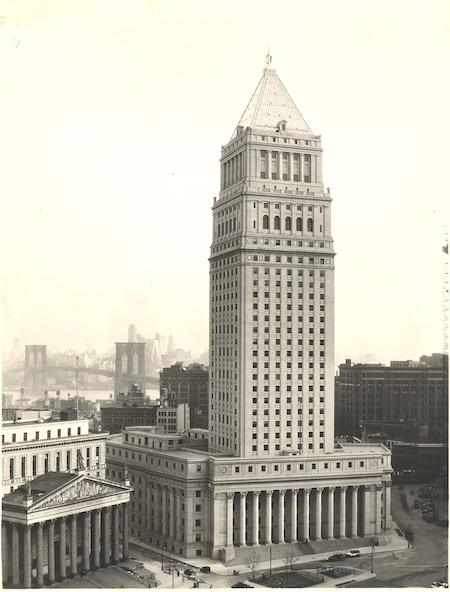You are here
Federal Judicial Center Celebrates 50 Years
Federal Judicial History

In the late 1980s, the Committee on the Judicial Branch of the Judicial Conference of the United States proposed the creation of a history program at the FJC. The proposal was born of an appreciation for the importance of the history of the judicial branch as well as the realization that the branch had taken no major steps to bring its past to light. In response to the committee's proposal, which was endorsed by the FJC's governing Board, Congress in 1988 expanded the FJC's statutory mandate, providing that the Center should "conduct, coordinate, and encourage programs relating to the history of the Judicial Branch of the United States Government." As a result of this directive, the History Office began operations in 1989. Below is a decade-by-decade look at the work of the History Office, highlighting its major initiatives and publications:
1989–1990s
- Held seminar for history programs in the federal courts addressing the subjects of court records, papers of judges, judicial oral history, bicentennial commemoration, and the administration of court history programs
- Published a guide for conducting oral history projects and gathered information on existing oral history interviews related to the federal courts
- Participated in a joint AO/FJC Committee on Court Records, and published the first edition of the Guide to the Preservation of Federal Judges' Papers
- Began compilation of biographical and service information for all judges appointed under Article III of the U.S. Constitution since 1789
- Published the first edition of Creating the Federal Judicial System
- Collaborated with the Supreme Court Historical Society on the Supreme Court Oral History Project
- Published the Directory of Manuscript Collections of Federal Judges
2000s
- Launched the History of the Federal Judiciary website
- Developed and expanded the historical content on the judiciary, the courts, courthouses, and the agencies of the Judicial Branch
- The Biographical Directory of Federal Judges, 1789-present went online
- Began the Federal Trials and Great Debates annual summer teachers institute in partnership with the American Bar Association Division for Public Education
- Began developing resources for teachers on historical cases in the federal trial courts
2010s
- Published the Guide to Research in Federal Judicial History
- Published Debates on the Federal Judiciary: A Documentary History, three volumes
- Published Federal Judiciary Appropriations, 1792–2010
- Collaborated with the Supreme Court Historical Society to sponsor the publication a one-volume history of the federal courts, The Federal Courts: An Essential History, written by Peter Charles Hoffer, Williamjames Hull Hoffer, and N.E.H. Hull (published by Oxford University Press in 2016)
- Held conferences with legal historians on the history of the federal courts
- Launched @FedJudicialHist Twitter feed
A closer look at three History Office initiatives over time:
Providing Historical Data on the Judiciary: The Biographical Directory of Article III Federal Judges, 1789–present
Since its creation, the History Office has collected and compiled historical data on the federal courts to assist researchers and others interested in the study of the courts. Data collected by the office includes information on judicial salaries, judiciary appropriations, courthouses, impeachments, caseloads, and more.Its work compiling data on federal judges has been its most long-standing effort in this area and has produced the History Office's most substantial and comprehensive collection of historical data on the courts. Shortly after the office's inception, it began work on the compilation of biographical and service information for all judges appointed under Article III of the U.S. Constitution since 1789—a project that has continued ever since. The Biographical Directory of Federal Judges, 1789–present has been available on the FJC's website since 2000 and contains biographical data, detailed information on federal judicial service, and a listing of other professional experience for the more than 3,500 individuals who have served as federal judges appointed pursuant to Article III.
Educating About the History of the Federal Courts: the FJC/ABA Summer Institute for Teachers
Over the years, the History Office has encouraged greater public education on the history of the federal courts by helping to promote court historical societies and historical programs, and by developing resources for teachers. Since 2006, the Federal Judicial Center, in partnership with the American Bar Association Division for Public Education, has hosted Federal Trials and Great Debates, an annual summer institute for teachers of history, law, and government. Teachers from across the country come to Washington, D.C., each year to meet with federal judges, scholars, and curriculum experts to study historic cases in the federal courts and to discuss effective ways to teach about courts and the law.
Promoting Preservation of the Historical Record: Guide to the Preservation of Federal Judges' Papers
Through its work on the preservation of federal judges' papers, the History Office has helped to encourage a fuller historical records of the courts and helped federal judges as they consider their role in contributing to the historical record. In the 1990s, the History Office began compiling information about the location of collections of judicial papers and worked with the Administrative Office on a joint committee on court records. It also developed guidance for judges about the preservation of personal papers, and the process of making those materials available for research. That guidance was published in the first edition of the Guide to the Preservation of Federal Judges' Papers in 1996. Since then the nature of judges' papers has changed as more and more of the work of the federal courts is documented in electronic records and as the record-keeping practices of the courts have changed. The History Office has kept apace with these changes, providing updated guidance periodically.

